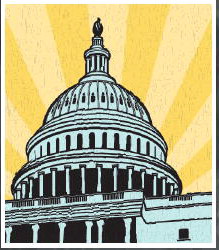Teachable Moment


the What are “pork barrel spending” and “earmarks”?
Both are livestock terms from an agricultural era with negative political connotations. “Pork barrel spending” referred to politicians’ sending barrels of salted pork to voters as a bribe for votes. “Earmark” referred to notching the ears to show ownership of animals. Now the terms refer to wasteful government spending that congressmen sneak into legitimate spending bills so they can spend federal taxpayer dollars on projects that benefit only a few people in their home districts.
Earmarks usually breed corruption and fraud, and were banned by Congress itself in 2011 because lawmakers would vote for each other’s bills if they contained earmarks for themselves. Many members of Congress have urged that each bill should stand alone with designated funds going to a sole purpose with no added earmarks. However, the Democratic House Appropriations Committee is now bringing back earmarks, rebranding them as “community project funding.” With earmarks, states are required to add local funds to go with the federal funds, whether or not they want the project. Here are some unethical earmarks added to bigger spending bills requested by lawmakers in the upcoming federal budget: opencommunity arts space, MA; pickleball and fitness circuit, CA; arts of Africa collections, NY; barbeque areas and picnic areas, CA; community statue project, TX; planned parenthood clinic, CA; Black enterprise, art, history, performance building, WI; program featuring “inclusion and healthy discussions around difficult issues such as racism, gender discrimination and cultural bias”, NY; meditation and yoga program, NJ; “equity and inclusion” program, PA; staff for a Syrian community, IL; school programs “socialemotional learning”, IL; couples and group counseling, CA; initiative to celebrate history and culture of Black Los Angeles, CA; green infrastructure retrofit of embassy parking lot, MA.





